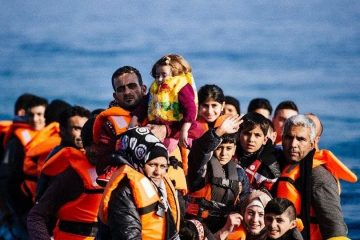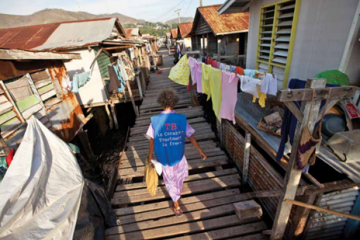“Health is a human right, not a privilege. No one should get sick and die from diseases that are preventable and treatable. All our efforts in the response and green recovery to COVID-19 need to ensure that other diseases, such as malaria, are not neglected. We must continue to invest in youth-led solutions to combat malaria around the world”.
– Ms. Jayathma Wickramanayake, United Nations Secretary General’s Envoy on Youth
A Human Rights Issue: Malaria
Malaria is an important human rights issue for it is both a cause and a consequence of poverty, with its impact being felt by the poorest of individuals. Although considerable progress has been made and saved millions of lives, more than half of the world still lives at risk from this preventable, and treatable disease. Most of them are children under the age of five with the African continent carrying more than 90% of the global burden.
As one of the world’s oldest and deadliest diseases, malaria impoverishes families, households, economies and lowers worker productivity significantly, costing the African continent an estimated $12 billion every year.
What is World Malaria Day?
World Malaria Day is celebrated annually by the international community on April 25th as a pledge to acknowledge the global efforts to control malaria, to highlight our achievements thus far and to remind us of our responsibility to ensure a malaria-free world.
This year the internationally recognized day aims to unify and build on the ‘Zero Malaria Starts with Me’ movement, and the ‘Draw the Line Against Malaria’ campaign for youth. It’s inspiration stems from the hardships of the past year as the world tackled COVID-19 with consideration that the fight to end malaria has become even harder. The theme this year, “Zero Malaria – Draw the Line Against Malaria”, will explore and connect malaria elimination with high-burden settings to ensure continued progress and that no one is left behind.
The Right to Health
From a human rights perspective, the right to health reminds us that all people have the right to the highest attainable standard of health as codified in numerous legally binding international treaties, encompassing the underlying determinants of health, such as access to safe drinking water, adequate sanitation and access to health-related information. These individuals have the right to non-discriminatory and voluntary medical treatment, as well as the right to access essential primary health care; these are examples of other rights that fall under the right to health, placing a particular emphasis on the disadvantaged, the marginalized and those living in poverty.
Furthemore, the human rights framework in health urges us to ensure that our health systems are inclusive, effective and successful in serving individuals compassionately. Such a view encourages us, as health professionals, to think critically in demanding accountability and serves as a powerful tool for improving the health of all, everywhere. Questions to be mindful and consider when thinking about the right to health include:
- How will we ensure that the voices of women and girls are heard, respected, and that the poorest and most marginalized have access to health services?
- Why are maternal and infant mortality rates worsening for some ethnic minorities, and are health programmes respectful of the different cultures and available in minority languages?

What Can We Do To Achieve a Malaria-Free World?
- Reinforce existing anti-malaria initiatives and help identify new effective anti-malaria policies, programmes and projects
- Ensure that individuals and communities receive information and education on prevention and health-promoting behaviors, such as crucial information about the proper use of antimalarial drugs, insecticides and indoor residual spraying procedures.
- Provide community volunteers with training to identify symptoms and provide malaria treatments in remote rural areas, where there is no accessible system of health clinics and medical care.
- Impose responsibilities on governments and policy makers to create education campaigns targeted at the most disadvantaged communities, be it via the media, village health teams, health workers, schools and faith-based organizations.
Given the burden of malaria, it is clear that as a disease it should be prioritized with an intention to dismantle societal obstacles to health interventions and innovative technologies.
Although governments have demonstrated their determination to achieve the Millenium Development Goal (MDG) 6, the need to combat HIV/AIDS, malaria and other diseases, malaria is still not seen as a human rights issue. Overcoming the obstacles of the present century is necessary to create a malaria-free world where health and human rights set the foundation that strengthens prevention and treatment, including for infants, pregnant women and those living in poverty. All stake-holders working on combating the disease, from pharmaceutical companies, policy makers, institutions, non-governmental organizations and public-private partnerships, have human rights duties.
In the struggle against malaria, it is time for the human rights perspective on health to be respected, free from exaggeration, but with clarity and conviction encouraging accountability and action..

Lastly, this World Malaria Day, as a community of global citizens, it is our responsibility to protect and accelerate the gains against malaria. We must pay special attention to leveraging investments to fight COVID and emerging disease by:
- Engaging with political leaders and influential members of society in order to attract new sources of funding.
- Raising awareness about malaria prevention, testing, and care among vulnerable communities so that there is increased visibility of malaria programmes and conversations about the disease.
- Empowering the next generation to hold leaders accountable so that we may achieve our goals of a malaria free world from a preventable and treatable disease that continues to steal futures and kills a child every two minutes.
References:
- https://www.un.org/en/chronicle/article/poverty-malaria-and-right-health-exploring-connect ions



0 Comments